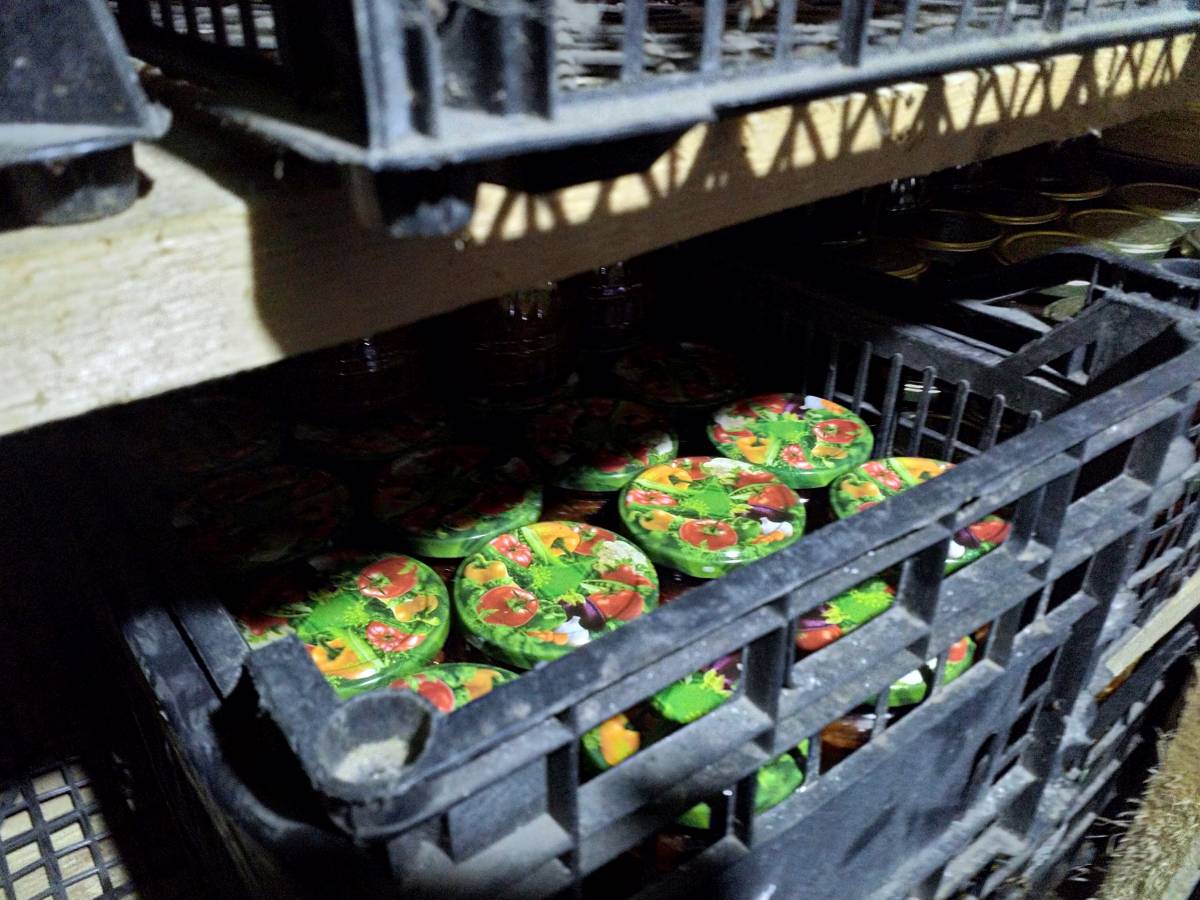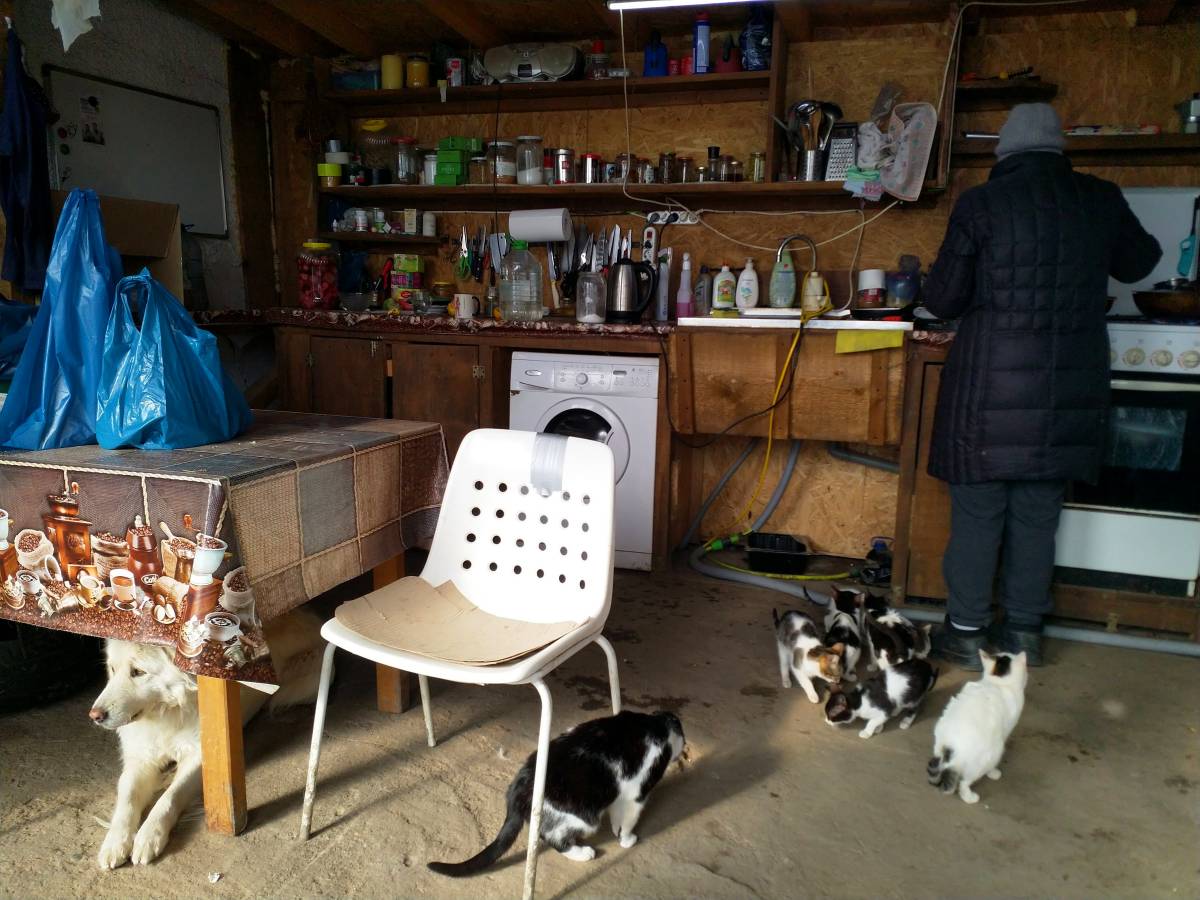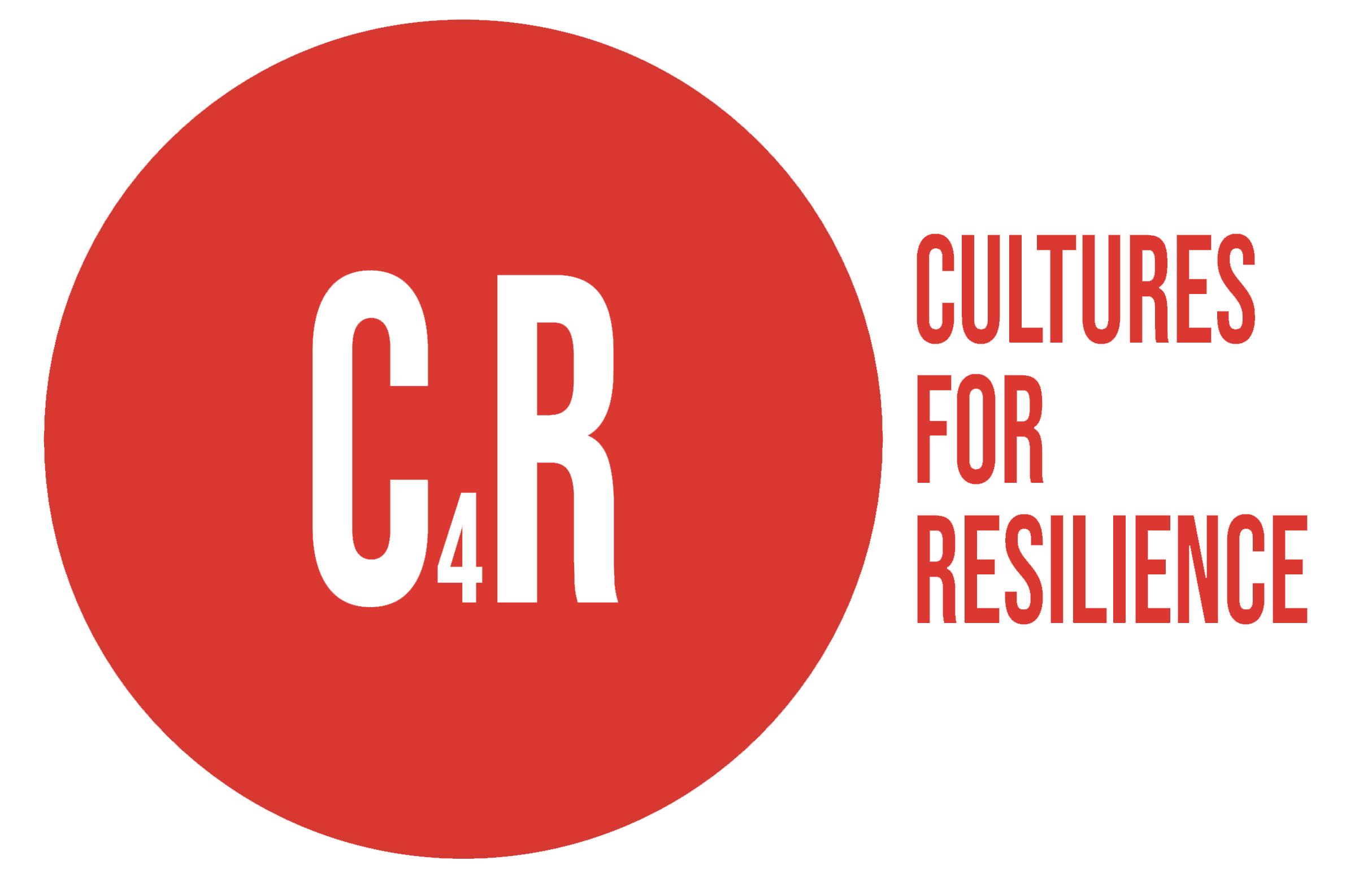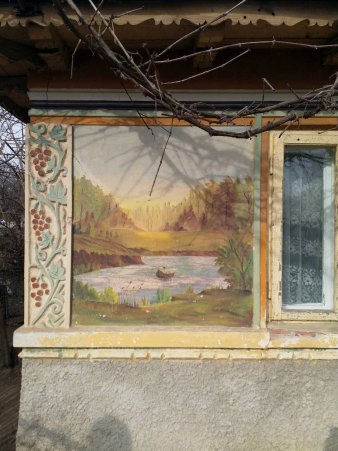Ograda lui Luca [Luca’s farm] and the search for the lost balance
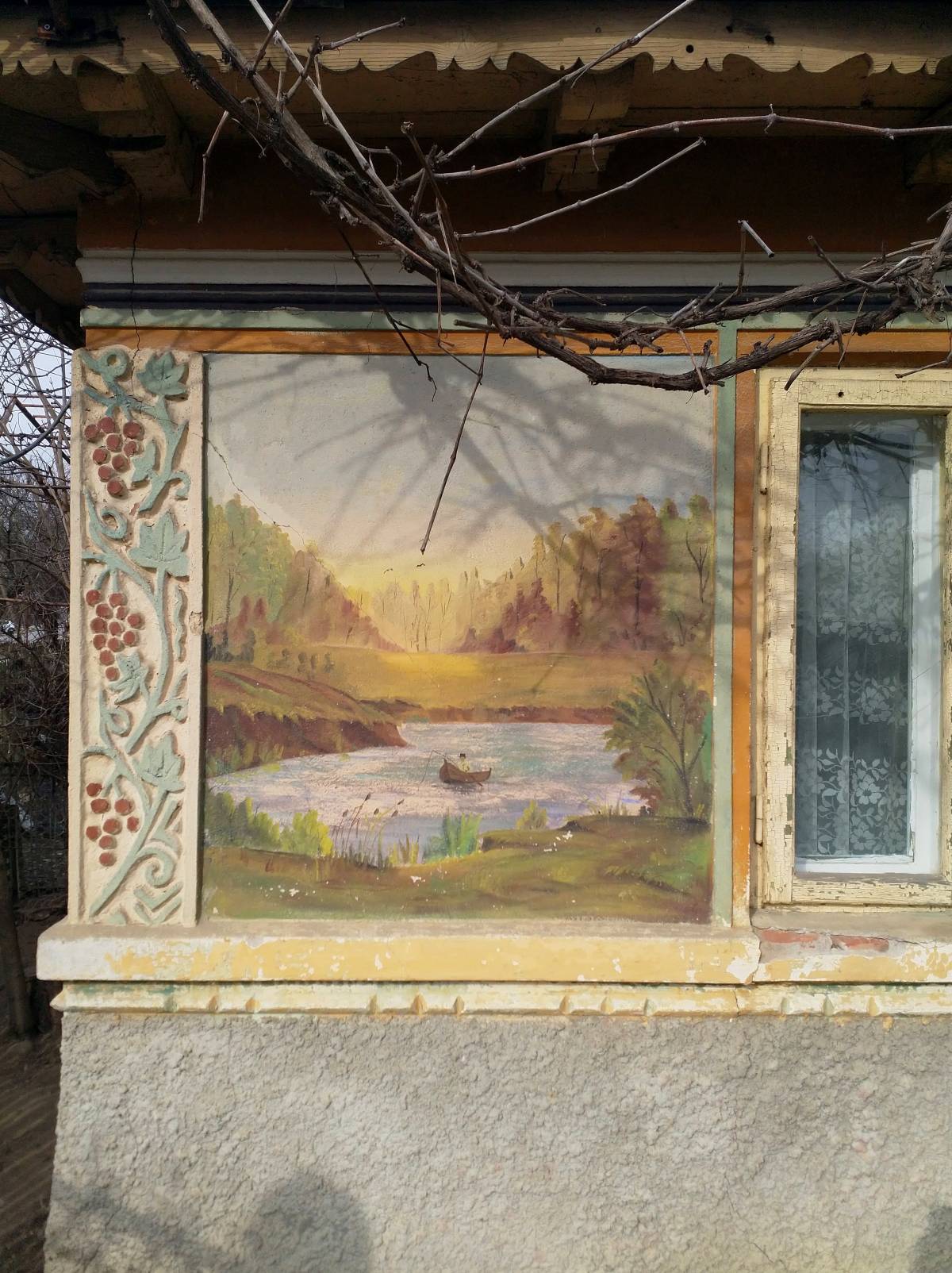
Since 2015, Ograda lui Luca [Luca’s farm] has been growing in the Cornești commune, Ungureni village, Dâmbovița county; it’s closer to Ploiești than to București, as you drive on DN1A. The household with chickens and a solarium was initiated by Mihai Luca following the principles of ecological agriculture and the need of his family to have healthy food. Now they can sustain themselves from the products of their garden, which they deliver weekly in Bucharest to their clients’ door.
From the narrow road, which can barely allow two cars to pass at the same time, all houses look pretty much the same, short over the fence, perpendicular on the street, with the rooms stringing towards the back of the yard. Some do keep a good side on the corner towards the street, with landscapes painted on the exterior plaster and framed by stucco vines. Scenes with lakes, forests or pastures, where people fish, harvest or work, decorate the houses and enliven the road, together with the usual greeting of every passer-by and the barking of dogs over the fence. Ograda is easy to spot, the only yard with a solarium and outhouses all over the place, a sign of the seasonal activities taking place in the household.
Mihai Luca was stretching the thermal foil over the solarium together with Gabi, the woman who has been helping in the garden for the past 3-4 years. With clips soaked in warm water, the foil is pinned to the arched rib made from galvanized tubing planted in the ground. Despite the cold outside, inside it’s nice and warm. The story of the household is advancing in the rhythm of working in the solarium. After a series of unfortunate experiences with all kinds of jobs where collaborating with bosses and colleagues was always unpleasant, he said, “let’s try and do something on our own backs”. Especially given that their son was starting performance sports and “he had to eat well”. As they were living in Pantelimon, first they looked for land around Bucharest. The steep prices drove him 50km away, to Ungureni, by recommendation of a friend who had bought land there. He found something within his budget, a courtyard with an old house and land where he began cultivating 50 stalks of tomatoes and kept a few hens. His wife, Ana Maria, supported him unconditionally and “kept house”, especially in the beginning, until he set up Ograda. “The first three years have been a struggle”, while he worked alone, but the farm was growing. Then he employed Gabi and now Ograda has a coop for 60-70 hens, as well as a flock of 15 guinea hens, a few Muscovy ducks and five solaria. The cultivated lands at the back of the house belong both to him and his neighbours, which rather than “keeping the land barren”, made a deal to hand it to him, with or without rent.
The first hens he had were ”the fancy kind”, only to discover they weren’t good to lay eggs or for meat, and moved on to local breeds. Although he grew up in the city, he was raised by his grandmother in the countryside until he was 7 years old, where “it was good, she had a dairy cow”. It’s there where he learned his ways around the yard, the garden and the hens, which he sacrificed them himself. “He was the man of the yard”, adds his mother, who returned after working in Italy for 16 years and gave up living in the city, moving across the street from Ograda. At first she didn’t like what Mihai was doing, but when she saw how much he’s working, “like a tractor in the furrow”, how much passion he has and the taste of the produce, she was convinced. Now they are gathering in the summer kitchen to prepare the lunch. Here, warmed by a stove improvized from a tin barrel with the chimney outside, are the people of the house, friends stopping by for a tea, the dog of the yard and a family of cats Mihai’s mother had saved this winter from the cold outside.
The summer kitchen is closed during winter time with the same translucid foil used in the solarium. It’s the only part redone by Mihai. The construction was kept as it was, used for sleeping and storage. The kitchen is extended with a shed packed with all sorts of tools, boxes and bags connecting it the noisy area of the coops. Here nothing is thrown away, everything is transformed: “this is an old door from a neighbour, another old door I found at someone’s place, the windows are old. You recycle. And only invest in what is strictly necessary”. Objects, materials, knowledge acquired through practice and ideas shared by others are recycled to make work on the farm easier. While a hen is hatching her eggs in a washing machine drum made into a nest, her colleagues are nibbling from an ingenious multi-feeder made from a tin barrel, and they drink water from a vessel which refills automatically with the help of a toilet float switch. A bit further are the compost bins with waste and chicken droppings, which ferments into “an extraordinary smell”, but is nevertheless a great fertilizer for the Ograda cultures.
He started with a 60sqm solarium, which he deemed to be too small, so the next one measured 120 sqm, also in the yard. He kept the first one for seedlings and bought another one from a second hand website, measuring 160 sqm (4x40m). Recently, he made another 200 sqm one (5x40m) in the field, where he is installing his fifth one, 240 sqm (5x40m). The soil in the solarium is tilled using a moto-tiller, a small equipment with two wheels and bicycle-like handles. He would need bigger equipment to extend his surfaces. He dreams of a two-wheel tractor (motocultor) which would ease his work, but can’t afford one, since it’s quite low on the list of priorities. The seedlings are watered constantly through a system of pipes with dropper all along the solaria. A few stalks of garlic, curly lettuce and salad are sprouting their heads from below the foil cover. Mihai takes a bite from a spinach leaf and hands me one while we talk about extensions: “you need to grow until the moment you can strike a balance between how much you can produce, how much you can sell and how much you need yourself”. A layer of onion seems already compromised, the seeds must have been diseased. Fungi, snails, slugs, all kinds of bugs and diseases, in addition to climate changes, they all constantly threaten organically grown cultures; no synthesized substances are being used – while it would make the cultures stronger, it would affect their taste and nutritional value. The work, the time and the financial resources laid into the soil are always at risk of being lost. This means the organic farming practised by Mihai at Ograda has many risks and requires permanent care.
Fundamental to this ecological agriculture process are the seeds. Mihai produces them himself or buys them. Aware of the risks presented by the hybridization of the seeds and the capturing of resources by the big corporations, Mihai looks at things from a practical perspective, too: seedlings are hybridized through continuous polenization and “they manage”. This means they adapt to the climate they live in, transmitting features specific to the local conditions. Thus, for Mihai, the seedlings are in continuous movement, being “conscious organisms, which learn from year to year”. However, climate change represents a constant threat, without local solutions at hand – everything becomes unpredictable, from “look, the sun is shining, it’s starting to get warmer” to “all of a sudden ice and snow hit and wrecked everything outside”.
From the street, market-like clamour is audible, an urgent megaphone voice shatters the pastoralism of the place and overflows like breaking news over the fences and gardens into the houses of the people. The voice is propagated from one car passing by daily through the village, it “sells everything you want”: construction materials, collecting scrap iron, delivering vegetables, fruit or bread. For the older villagers this mobile shop coming to their gates is more convenient than the two or three store-bodegas in the village. It’s also how the products of Ograda are delivered directly to the buyers’ doors, except Mihai only delivers what the clients order, no surplus. From Monday to Wednesday they handle the production, Thursday they pick the vegetables and wrap the packages, Friday they distribute them in Bucharest, and they spend the weekend in town with the family. The clients receive the week’s offer on a WhatsApp group and also place the minimum order. The client network was formed during the first year, from the Facebook page . Here he aims to “visually deliver” the story of the farm. Motivation, the household, the process, the products or preparation advice come one after the other on the page, depending on the season and a moment’s inspiration. The posts show and tell a story, but they also manage to construct feelings towards a nice, cheerful character, passionate with his work, even inspirational, telling us from his yard, “I’m alone, watch me do it”. The network of clients is formed around the need for healthy food, as well as the attachment towards Mihai and the story of Ograda. The group, comprising friends, acquaintances or recent clients function not only as a weekly income source, through orders, or conviviality, through delivery meetings, but also as a mechanism of solidarity economy, when needed. Through donations, loans or orders in advance, Mihai managed to buy the second solarium in the garden, and recently, to gather the sum of money he needed for the motocultor, using a donation call on his Facebook page. The clients become thus rather a circle of friends and supporters of the project, articulated through consumption, values and the relation with Mihai, into a reactive, empathetic and solidarity network. At the same time, the costs associated with ecological production, as well as the interaction and delivery modes limit the distribution towards people with medium income, connected to technology.
Beyond the initiation experience he had during the childhood spent at his grandmother, Mihai admits he started Ograda from scratch: “it was a vague start, I barely knew anything about agriculture”. He is self-taught, using internet sources or following advice from his friends who studied horticulture. He got up the nerve and learned practical things also from the few neighbours who are still gardening in the village. First from the priestess who sells in Matache market, then Maria, living across the field, in Cristeasca. He saw the solarium from the street, stopped, asked questions, until they started collaborating and he also delivers “from Maria”, which now has her separate chapter in the list. The inspiration to take on such a project, which changed the lifestyle of his family, comes from participating to a social entrepreneurship course in 2015-6. He learned a lot of good stuff there and met a lot of people involved in organic farming, which he kept in contact with. Beyond the model of identifying a need in society, which a social entrepreneur should address, while sustaining himself at the same time, Mihai “chewed the situation for a bit” and tried to adapt what he learned in the course to what he can change, because “you can’t change everything at once, only what fits you”.
We walk between the solarium and the fence where Mihai grew mushroom on logs, we pass the field where peas and potatoes are planted, which didn’t really sprout last year, then we pass onto the fields in the back yard. Somewhere in the distance a cluster of houses are seen among the leafless trees. It’s where Maria lives. From here, Mihai posts on the Facebook page images of gradient sunsets over horizon. Now it’s cloudy, but no clouds, just a grey mist covering everything. Mihai plucks dry plants and removes their roots from the soil: “it’s why I brought you here, look!, turnips, very tasty”. The gusts of wind which make us turn our faces away from the field bring along sounds of dogs, crows flying and suddenly the guinea hens ring the alarm to an imaginary danger. “As soon as warmth hits, they will begin laying eggs everyday”, Mihai rejoices waiting for the first omelet. I’m trying to discern what Mihai Luca is fit for, where the motivation and energy to work here week to week comes from. Is it about ecological, traditional or nutritional values, ethical impulses? “Now the impulse is to live!”, he closes with a smile.
Research, text and photos by Alex Axinte
Translation by Dana Andrei
The research is part of Regenerative-Reliable-Resourceful, the mapping of resilient practices in the Romanian countryside that tranzit.ro develops in the frame of C4R and of the Experimental Station for Research.
